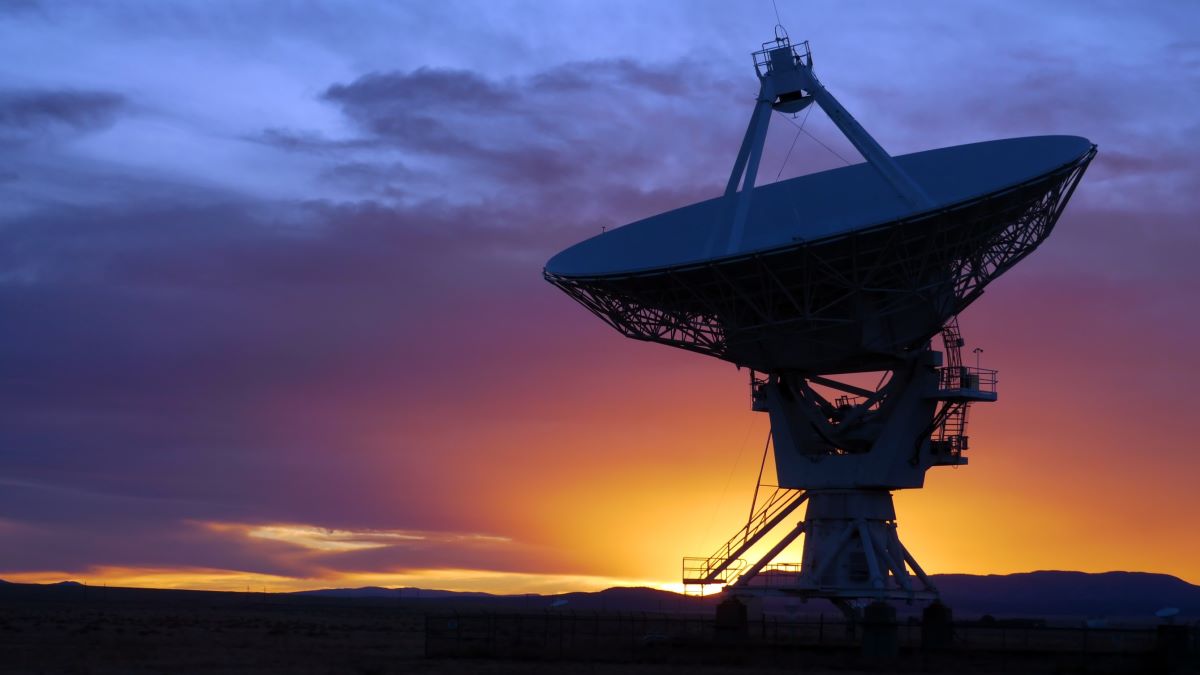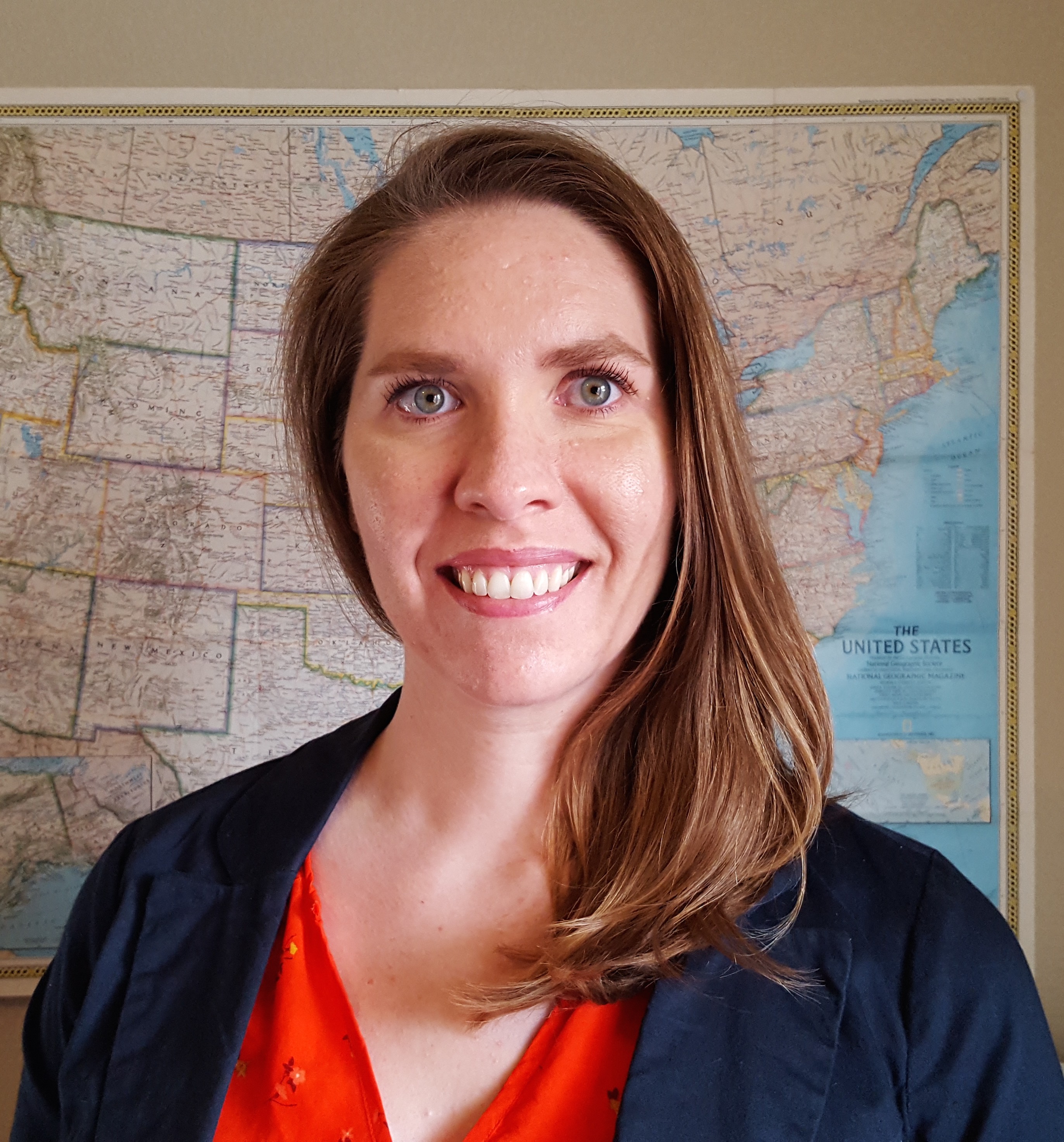Save @ APU
0 Entrance Exams
No GRE/GMAT Required
About Our Master of Science in Space Studies
Take a deep dive into the challenges associated with humankind’s exploration and interest in space with our online master’s degree program in space studies at American Public University (APU).
Space exploration faces political, economic, legal, commercial, scientific, and technical hurdles. Our degree program and courses take an informed approach, drawing from faculty members who are experienced astronomy and aerospace leaders.
This master's in space studies uses an advanced curriculum designed by a former NASA astronaut and provides multiple perspectives on the history of space exploration and the space industry.
Students enrolled in our graduate study program have the opportunity to participate in research projects, such as the Supernova Search Research. This research group actively watches for supernova events by observing a core group of galaxies. Similarly, the Exoplanet Transit Group observes and delineates exoplanets' orbital and physical properties.
Students who join our research groups gain access to telescope images acquired from our Wallace E. Boston Observatory. The Observatory houses a research-grade, 24-inch aperture PlaneWave telescope with remote control functionality. Performing astronomical research allows students to apply knowledge gained in the classroom to real-life context.
In addition, APU students can join the Analog Astronaut Research Group (AARG). Through AARG, students gain hands-on research experience and work on-site in facilities that mimic the living conditions in space.
What You Will Do in Our Master's in Space Studies Degree Program
- Understand the foundations and importance of space studies in relation to human space exploration/understanding of the cosmos
- Grow your familiarity with quantitative and qualitative research and statistical data related supporting aerospace science, astronomy, or space policy concepts
- Learn the history, chronology, and concepts for placing manned and unmanned vehicles in space
- Comprehend the importance of remote sensing satellites used to observe Earth and other celestial bodies in the solar system
- Study the psychological and physiological elements for supporting human life in a space environment, including spacesuit design/development
Degree at a Glance
$386.75** | $409.50***
-
Want to Learn More?
Program Requirements Printable Catalog Version
Students must choose a concentration for this degree program:
Provides an in-depth study in the discipline, with emphasis in both aircraft and spacecraft design/operations. Students take courses with comprehensive overviews of such topics as aircraft propulsion, aerodynamics and, aircraft design in addition to learning about orbital mechanics, rocket propulsion, and spacecraft design.
Objectives:
Upon successful completion of this concentration, the student will be able to:
- Categorize the laws of orbital mechanics -- calculate and illustrate the effects that gravity has on two-body mechanics including spacecraft maneuvers such as transfer orbits and rendezvous.
- Apply scientific principles and calculate problems related to aircraft propulsion systems.
- Examine liquid and solid rocket propulsion fundamentals including propellants, combustion principles, components, and general turbo-pump, and motor design.
- Assess the development, technology, and importance of satellite communications in our modern technological society.
- Synthesize the fundamentals of aerodynamics and aircraft/spacecraft design, building upon past and current technology to shape innovations for the future.
Must take all courses for this section.
Course ID: 3712
| Registration Dates | Course Dates | Session | Weeks |
|---|---|---|---|
| 01/27/25 - 07/04/25 | 07/07/25 - 08/31/25 | Summer 2025 Session B | 8 Week session |
| 02/24/25 - 08/01/25 | 08/04/25 - 09/28/25 | Summer 2025 Session I | 8 Week session |
| 03/31/25 - 08/29/25 | 09/01/25 - 10/26/25 | Summer 2025 Session D | 8 Week session |
Course ID: 4034
| Registration Dates | Course Dates | Session | Weeks |
|---|---|---|---|
| 02/24/25 - 08/01/25 | 08/04/25 - 09/28/25 | Summer 2025 Session I | 8 Week session |
| 05/26/25 - 10/31/25 | 11/03/25 - 12/28/25 | Fall 2025 Session I | 8 Week session |
Course ID: 3716
| Registration Dates | Course Dates | Session | Weeks |
|---|---|---|---|
| 01/27/25 - 07/04/25 | 07/07/25 - 08/31/25 | Summer 2025 Session B | 8 Week session |
Course ID: 3718
| Registration Dates | Course Dates | Session | Weeks |
|---|---|---|---|
| 01/27/25 - 07/04/25 | 07/07/25 - 08/31/25 | Summer 2025 Session B | 8 Week session |
Course ID: 4032
Course ID: 4033
| Registration Dates | Course Dates | Session | Weeks |
|---|---|---|---|
| 03/31/25 - 08/29/25 | 09/01/25 - 10/26/25 | Summer 2025 Session D | 8 Week session |
| 04/28/25 - 10/03/25 | 10/06/25 - 11/30/25 | Fall 2025 Session B | 8 Week session |
The program helps to cultivate leaders in the space industry, not only in NASA, but in the commercial realm of space operations. This concentration is ideal if you already have an administrative or business background. Coursework includes space diplomacy and law, space operations and organizations, as well as the historical, political, economic, legal, commercial, scientific, and technical challenges comprising this complex and rapidly changing discipline.
Objectives:
Upon successful completion of this concentration, the student will be able to:
- Examine the political and commercial significance of major national and international space missions, projects, and operations.
- Evaluate organizations that are critical to the success of the technological advance of space infrastructure in the United States.
- Assess the status of space cooperation and diplomacy between various space faring nations.
- Synthesize space laws and how the governing institutions affect applications such as remote sensing, communications, navigation, launch services, satellite exports, and arms control.
Must take all courses for this section.
Course ID: 3713
| Registration Dates | Course Dates | Session | Weeks |
|---|---|---|---|
| 01/27/25 - 07/04/25 | 07/07/25 - 08/31/25 | Summer 2025 Session B | 8 Week session |
Course ID: 3720
| Registration Dates | Course Dates | Session | Weeks |
|---|---|---|---|
| 02/24/25 - 08/01/25 | 08/04/25 - 09/28/25 | Summer 2025 Session I | 8 Week session |
Course ID: 3721
| Registration Dates | Course Dates | Session | Weeks |
|---|---|---|---|
| 02/24/25 - 08/01/25 | 08/04/25 - 09/28/25 | Summer 2025 Session I | 8 Week session |
Course ID: 3722
| Registration Dates | Course Dates | Session | Weeks |
|---|---|---|---|
| 05/26/25 - 10/31/25 | 11/03/25 - 12/28/25 | Fall 2025 Session I | 8 Week session |
Course ID: 4834
| Registration Dates | Course Dates | Session | Weeks |
|---|---|---|---|
| 04/28/25 - 10/03/25 | 10/06/25 - 11/30/25 | Fall 2025 Session B | 8 Week session |
Course ID: 3964
| Registration Dates | Course Dates | Session | Weeks |
|---|---|---|---|
| 01/27/25 - 07/04/25 | 07/07/25 - 08/31/25 | Summer 2025 Session B | 8 Week session |
| 03/31/25 - 08/29/25 | 09/01/25 - 10/26/25 | Summer 2025 Session D | 8 Week session |
The Earth and Planetary Sciences concentration is designed to provide students with an in-depth overview of our Solar System. Topics covered include planetary geology, with special emphasis on geology of the Moon and Mars. Small Solar System objects such as natural satellites, planetary rings, comets, and asteroids are also considered. Students study the origin of atmospheres on the Earth, Venus, Mars, and Saturn’s moon Titan. Planetary mapping techniques and GIS fundamentals are considered in this concentration as well.
Objectives:
Upon successful completion of this concentration, the student will be able to:
- Use the scientific method and scientific tools to solve programs related to the Earth and planets.
- Identify the process and features associated with the Earth and planetary interiors, landscapes, oceans, and atmospheres.
- Demonstrate a comprehensive understanding of the interrelated physical, chemical, and geological processes operating on the Earth and other planets.
- Present earth and planetary science information clearly, in multiple formats (written, oral, graphically).
- Analyze the origin, composition, and nature of planetary atmospheres.
- Explain how terrestrial moons and planets are mapped utilizing state-of-the-art GIS techniques.
- Demonstrate good scientific ethics.
Must take all courses for this section.
Course ID: 5424
| Registration Dates | Course Dates | Session | Weeks |
|---|---|---|---|
| 01/27/25 - 07/04/25 | 07/07/25 - 08/31/25 | Summer 2025 Session B | 8 Week session |
| 05/26/25 - 10/31/25 | 11/03/25 - 12/28/25 | Fall 2025 Session I | 8 Week session |
| 06/30/25 - 11/28/25 | 12/01/25 - 01/25/26 | Fall 2025 Session D | 8 Week session |
Course ID: 5425
Course ID: 5426
| Registration Dates | Course Dates | Session | Weeks |
|---|---|---|---|
| 03/31/25 - 08/29/25 | 09/01/25 - 10/26/25 | Summer 2025 Session D | 8 Week session |
Course ID: 5427
| Registration Dates | Course Dates | Session | Weeks |
|---|---|---|---|
| 03/31/25 - 08/29/25 | 09/01/25 - 10/26/25 | Summer 2025 Session D | 8 Week session |
Course ID: 5428
| Registration Dates | Course Dates | Session | Weeks |
|---|---|---|---|
| 02/24/25 - 08/01/25 | 08/04/25 - 09/28/25 | Summer 2025 Session I | 8 Week session |
Course ID: 5429
| Registration Dates | Course Dates | Session | Weeks |
|---|---|---|---|
| 02/24/25 - 08/01/25 | 08/04/25 - 09/28/25 | Summer 2025 Session I | 8 Week session |
| 03/31/25 - 08/29/25 | 09/01/25 - 10/26/25 | Summer 2025 Session D | 8 Week session |
| 04/28/25 - 10/03/25 | 10/06/25 - 11/30/25 | Fall 2025 Session B | 8 Week session |
A diverse range of courses provide an inclusive synopsis of astronomy – from the Solar System to stars and galaxies. You will learn about astronomical instrumentation, with the opportunity to access the university’s observatory and the PlaneWave CDK24 robotic telescope.
Objectives:
Upon successful completion of this concentration, the student will be able to:
- Demonstrate an in-depth understanding of Solar System -- including planets, comets, asteroids, and meteorites.
- Analyze the celestial objects found beyond our Solar System: stars, exoplanets, galaxies, and possible extraterrestrial life.
- Evaluate the geology of the Moon and Mars as related to their significance for near future human exploration of the Solar System.
- Critique the various configurations of telescopes and their use in the exploration of all types of electromagnetic radiation – from radio waves to gamma rays.
- Synthesize the history of astronomy, from ancient Greece to our modern cosmological model of the universe.
Must take all courses for this section.
Course ID: 3931
| Registration Dates | Course Dates | Session | Weeks |
|---|---|---|---|
| 01/27/25 - 07/04/25 | 07/07/25 - 10/26/25 | Summer 2025 Session A | 16 Week session |
| 03/31/25 - 08/29/25 | 09/01/25 - 12/21/25 | Summer 2025 Session C | 16 Week session |
| 04/28/25 - 10/03/25 | 10/06/25 - 01/25/26 | Fall 2025 Session A | 16 Week session |
Course ID: 3932
| Registration Dates | Course Dates | Session | Weeks |
|---|---|---|---|
| 01/27/25 - 07/04/25 | 07/07/25 - 10/26/25 | Summer 2025 Session A | 16 Week session |
| 05/26/25 - 10/31/25 | 11/03/25 - 02/22/26 | Fall 2025 Session K | 16 Week session |
| 06/30/25 - 11/28/25 | 12/01/25 - 03/22/26 | Fall 2025 Session C | 16 Week session |
Course ID: 3934
Course ID: 4943
Course ID: 5426
| Registration Dates | Course Dates | Session | Weeks |
|---|---|---|---|
| 03/31/25 - 08/29/25 | 09/01/25 - 10/26/25 | Summer 2025 Session D | 8 Week session |
Course ID: 5427
| Registration Dates | Course Dates | Session | Weeks |
|---|---|---|---|
| 03/31/25 - 08/29/25 | 09/01/25 - 10/26/25 | Summer 2025 Session D | 8 Week session |
Must take all courses for this section.
Course ID: 3629
| Registration Dates | Course Dates | Session | Weeks |
|---|---|---|---|
| 01/27/25 - 07/04/25 | 07/07/25 - 08/31/25 | Summer 2025 Session B | 8 Week session |
| 02/24/25 - 08/01/25 | 08/04/25 - 09/28/25 | Summer 2025 Session I | 8 Week session |
| 03/31/25 - 08/29/25 | 09/01/25 - 10/26/25 | Summer 2025 Session D | 8 Week session |
Course ID: 3711
| Registration Dates | Course Dates | Session | Weeks |
|---|---|---|---|
| 01/27/25 - 07/04/25 | 07/07/25 - 08/31/25 | Summer 2025 Session B | 8 Week session |
| 02/24/25 - 08/01/25 | 08/04/25 - 09/28/25 | Summer 2025 Session I | 8 Week session |
| 03/31/25 - 08/29/25 | 09/01/25 - 10/26/25 | Summer 2025 Session D | 8 Week session |
| 04/28/25 - 10/03/25 | 10/06/25 - 11/30/25 | Fall 2025 Session B | 8 Week session |
| 06/30/25 - 11/28/25 | 12/01/25 - 01/25/26 | Fall 2025 Session D | 8 Week session |
Choose 9 credit hours from this section.
Course ID: 3719
| Registration Dates | Course Dates | Session | Weeks |
|---|---|---|---|
| 01/27/25 - 07/04/25 | 07/07/25 - 08/31/25 | Summer 2025 Session B | 8 Week session |
| 03/31/25 - 08/29/25 | 09/01/25 - 10/26/25 | Summer 2025 Session D | 8 Week session |
| 04/28/25 - 10/03/25 | 10/06/25 - 11/30/25 | Fall 2025 Session B | 8 Week session |
Course ID: 3717
| Registration Dates | Course Dates | Session | Weeks |
|---|---|---|---|
| 01/27/25 - 07/04/25 | 07/07/25 - 08/31/25 | Summer 2025 Session B | 8 Week session |
| 02/24/25 - 08/01/25 | 08/04/25 - 09/28/25 | Summer 2025 Session I | 8 Week session |
| 03/31/25 - 08/29/25 | 09/01/25 - 10/26/25 | Summer 2025 Session D | 8 Week session |
| 05/26/25 - 10/31/25 | 11/03/25 - 12/28/25 | Fall 2025 Session I | 8 Week session |
| 06/30/25 - 11/28/25 | 12/01/25 - 01/25/26 | Fall 2025 Session D | 8 Week session |
Course ID: 3715
| Registration Dates | Course Dates | Session | Weeks |
|---|---|---|---|
| 02/24/25 - 08/01/25 | 08/04/25 - 09/28/25 | Summer 2025 Session I | 8 Week session |
| 05/26/25 - 10/31/25 | 11/03/25 - 12/28/25 | Fall 2025 Session I | 8 Week session |
| 06/30/25 - 11/28/25 | 12/01/25 - 01/25/26 | Fall 2025 Session D | 8 Week session |
Course ID: 5442
| Registration Dates | Course Dates | Session | Weeks |
|---|---|---|---|
| 01/27/25 - 07/04/25 | 07/07/25 - 08/31/25 | Summer 2025 Session B | 8 Week session |
Choose 3 credit hours from this section.
Course ID: 4944
| Registration Dates | Course Dates | Session | Weeks |
|---|---|---|---|
| 01/27/25 - 07/04/25 | 07/07/25 - 08/31/25 | Summer 2025 Session B | 8 Week session |
| 02/24/25 - 08/01/25 | 08/04/25 - 09/28/25 | Summer 2025 Session I | 8 Week session |
| 03/31/25 - 08/29/25 | 09/01/25 - 10/26/25 | Summer 2025 Session D | 8 Week session |
| 04/28/25 - 10/03/25 | 10/06/25 - 11/30/25 | Fall 2025 Session B | 8 Week session |
| 05/26/25 - 10/31/25 | 11/03/25 - 12/28/25 | Fall 2025 Session I | 8 Week session |
| 06/30/25 - 11/28/25 | 12/01/25 - 01/25/26 | Fall 2025 Session D | 8 Week session |
Course ID: 3965
| Registration Dates | Course Dates | Session | Weeks |
|---|---|---|---|
| 01/27/25 - 07/04/25 | 07/07/25 - 10/26/25 | Summer 2025 Session A | 16 Week session |
| 02/24/25 - 08/01/25 | 08/04/25 - 11/23/25 | Summer 2025 Session K | 16 Week session |
| 03/31/25 - 08/29/25 | 09/01/25 - 12/21/25 | Summer 2025 Session C | 16 Week session |
| 04/28/25 - 10/03/25 | 10/06/25 - 01/25/26 | Fall 2025 Session A | 16 Week session |
| 05/26/25 - 10/31/25 | 11/03/25 - 02/22/26 | Fall 2025 Session K | 16 Week session |
| 06/30/25 - 11/28/25 | 12/01/25 - 03/22/26 | Fall 2025 Session C | 16 Week session |
Why Pursue a Master’s Degree in Space Studies at American Public University?
Space studies, also known as “space science,” is a multidisciplinary academic field that cultivates knowledge of the universe. It places special emphasis on protecting, supporting, and investing in space operations.
American Public University’s space studies program offers an immersive online learning experience. Coursework strengthens students’ understanding of our nation’s space program and how it contributes to scientific advancements. Learners who pursue this master’s degree discuss space engineering, space law, space operations, space policy, physics, and astronomy.
Our University also offers degree concentration options in specialty areas, such as planetary sciences. Students explore the depths of our solar system as they consider the various applications for space-related research.
Gain Advanced Knowledge of Space Science
This online master of science program is designed to provide an in-depth overview of the space environment. You will conduct your own research and examine data to collect insights into our universe.
As you learn about astronomy, you will also discuss a broad scope of topics:
- The movement of objects in the sky
- How astronomers decode the light from distant objects
- The properties and structures of the stars, moon, galaxies, planets, and solar system
Courses provide an opportunity to take an eye-opening journey through the history of early rocketry, as well, from the development of satellite navigation to modern space operations.
Explore American Public University’s Research Opportunities and Scholarly Distinctions
American Public University students have access to a plethora of school-sponsored publications, events, and research opportunities. These resources add real-life context to the theories and concepts students explore as part of their required coursework.
For example, students may work with faculty mentors to submit their own scientific manuscripts to be considered for publication in the Space Education and Strategic Applications (SESA) Journal.
The SESA Journal is a peer-reviewed, open-access publication. It is run by the Policy Studies Organization (PSO) and the American Public University System (APUS), which includes APU. Each month, this publication features a Student Scholarship Submission.
Every September, APUS and PSO also sponsor the SESA conference, which offers complimentary admission to students and faculty. This virtual event brings together researchers, practitioners, and industry authorities to discuss the latest findings within the space industry.
Additionally, students may participate in the University’s space studies research groups to further enrich their experience at APU. These groups provide learners with the opportunity to examine images captured by our University Observatory, which houses a 650-pound PlaneWave CDK24 reflective telescope with a two-foot-wide mirror.
Using telescopic images from the observatory and other databases, learners can study and observe celestial bodies, including exoplanets, the sun, asteroids, and stars.
Furthermore, our labs and courses incorporate the NASA Exoplanet Database, a public record of planets that exist beyond our solar system.

Participate in Space Exploration Simulations With AARG
APU’s Analog Astronaut Research Group (AARG) challenges learners to apply their space sciences knowledge and skills to real-world research. As members of AARG, students have the unique opportunity to participate in hands-on activities called “analog missions.”
An analog mission simulates the experience of leaving Earth and working as an astronaut. In fact, AARG refers to members who participate in these analog missions as “analog astronaut crews.”
These crews travel to various locations (known as “habitats”) throughout the country. Habitats are nationally recognized facilities that recreate living conditions in space. Crews live and work in these habitats for a given timeframe. Each mission, therefore, allows AARG members to better understand how it feels to conduct research in space.
Discover Additional Space Science Clubs and Organizations
Association for Women in Science (AWIS): On a mission to help women reach their full potential, AWIS advocates for and empowers women in science, technology, engineering, and mathematics.
American Institute of Aeronautics and Astronautics (AIAA): AIAA is dedicated to shaping the future of space science and advancing aerospace engineering. It provides members with access to networking opportunities and professional development through resources that include publications, conferences, and continuing education courses.
Students for the Exploration and Development of Space (SEDS): SEDS grants students the opportunity to make an impact in space exploration while networking with and learning from pioneers in space.
Women in STEM (wSTEM): wSTEM advocates for increased female representation in STEM fields. This community also offers networking opportunities, professional development resources, and career development support to its members.
What Makes American Public University’s Space Studies Program Stand Out?
Affordability
Our university strives to make higher education more accessible through affordable tuition rates and specialized grants. When you enroll in this fully online program, you can also save on expenses associated with traditional brick-and-mortar institutions, like commuting costs and room and board fees. In addition, American Public University offers:
- No-cost admission applications
- A $0 transfer credit evaluation
- No entrance exam requirements
- Generous transfer credit opportunities
Flexibility
American Public University’s fully online space studies program allows you to connect with other students from anywhere in the world. Graduate study classes start monthly and have no set login times. You will complete assignments each week and engage in thought-provoking discussions with faculty and classmates.
Accreditation
American Public University System (APUS) is accredited by the Higher Learning Commission (hlcommission.org), an institutional accreditation agency recognized by the U.S. Department of Education. The Commission accredits degree-granting institutions nationwide is also recognized by the Council for Higher Education Accreditation. American Public University is part of APUS.
Frequently Asked Questions
Before you pursue a degree in space studies or a related field, consider how the curriculum aligns with your personal interests and career goals. As a space studies major, for example, you will have the opportunity to explore topics such as aerospace engineering, astronomy, planetary sciences, physics, mathematics, space policy, and natural sciences.
Space studies is considered a STEM (science, technology, engineering, and mathematics) discipline. The Space Studies Master of Science combines courses in astronomy, aerospace science, physics, engineering, natural sciences, and space policy. Students discuss advanced technical and scientific principles as they gain hands-on experience through lab assignments and research projects.
A graduate with a Master of Science in Space Studies might explore opportunities in the private sector, the education space, or even government agencies involved in space exploration. Coursework within a space studies master’s program covers a broad scope of subjects, including astronomy, physics, engineering, orbital mechanics, space law, and space policy.
Admission Requirements
- All APU master's degree/graduate certificate programs require a bachelor’s degree (or higher) from an institution whose accreditation is recognized by the Council for Higher Education Accreditation (CHEA®). Please read all graduate admission requirements before applying to this program and be prepared to submit the required documentation.
- There is no fee to complete the APU admission application for this program. View steps to apply.
CHEA® is a registered trademark of the Council for Higher Education Accreditation.
Materials Cost
Technology fee: $85 per course
Need Help?
Selecting the right program to meet your educational goals is a key step in ensuring a successful outcome. If you are unsure of which program to choose, or need more information, please contact an APU admissions representative at 877-755-2787 or [email protected].
Consumer Information
Disclosures
Maryland Residents learn more about costs, completion rates, median debt, and more.
1The University reserves the right to accept or deny credits according to policies outlined on our University website. Please see the University's transfer credit policy webpage for complete information.
*Cost Per Credit Hour
The Preferred Military Rate is $250 per credit hour for undergraduate and master's-level courses. This rate is available to all U.S. active-duty servicemembers, National Guard members, Reservists, and military families, including parents, spouses, legal partners, siblings, and dependents.
See all military student benefits.
Cost of Attendance
Learn more about American Public University's cost components and full cost of attendance.








